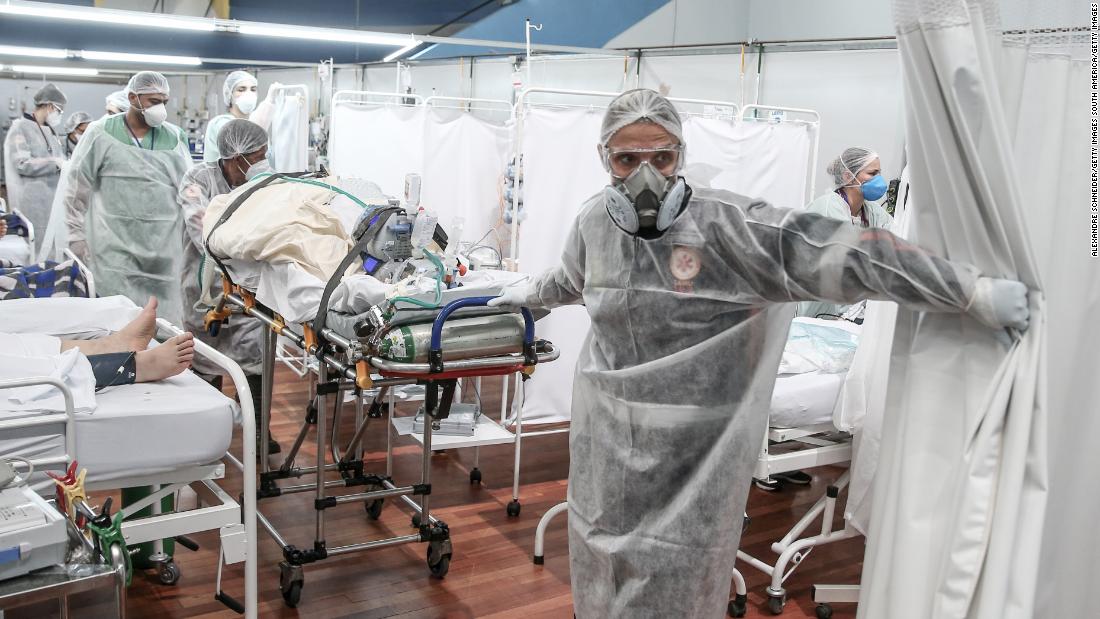But these are not normal times. Few hospitals today have space to receive new patients, even in the richest and most populous state of Brazil.
When Dineia Martins Firmino entered the hospital in early March, doctors intubated the 76-year-old lady and told the family that she desperately needed to be transferred to an ICU for more sophisticated treatment, according to her granddaughter Pamela Rivippi, 30.
It never left the official government list for transfer. “No vacancies came when she needed them and she ended up dying on Saturday,” said Ravippi. “We did the funeral on Sunday.”
The ferocious new wave of the coronavirus that took Firmino’s life is flooding intensive care beds in São Paulo and across the country.
As of Sunday, 21 Brazilian states and the Federal District had an ICU occupancy rate of more than 80%. Of these, 14 were on the verge of collapse with an occupancy of over 90%.
In the south of the state of Rio Grande do Sul, the ICUs are so overburdened that the largest public hospital that handles cases of Covid-19 in the state capital, Porto Alegre, said on Sunday that it was forced to close its doors to new patients.
“The Covid ward of the hospital’s ICU already serves 132% occupancy,” said the administration of Hospital das Clínicas in Porto Alegre in a note.
With the wards full, there is a growing demand for oxygen and other basic needs. To the north, the state of Rondônia has 97.6% occupancy in the ICU and the Attorney General’s Office warned that the local supply of oxygen could run out in just two weeks.
Brazil’s Health Minister Pazuello, himself currently under investigation to deal with the Manaus crisis, recently estimated that 22 to 25 million doses would be available in March – a sharp drop from previous predictions that up to 46 million doses vaccine doses would be available this month.
The federal government is negotiating new vaccine deals, including a purchase order for Russian-made Sputnik V. But scarcity persists for now. In the coastal city of Rio de Janeiro, the authorities have already been forced to suspend the administration of the first doses. The campaign will be restarted when more vaccines are made available by the Brazilian Ministry of Health, said Mayor Eduardo Paes.
With the number of daily deaths in the thousands, every hour that passes means lost lives.
In a bleak five-day stretch this month, a dozen Covid-19 patients died at Dr. Akira Tada Hospital, according to hospital officials. All were on the waiting list to be transferred to the ICU.
Dr. Maria Dolores da Silva, an emergency doctor at the hospital, has never seen anything like it. A 42-year-old veteran of Brazil’s public health system, she doesn’t usually vent talking about her job, but in an interview with CNN, she lowered her head and cried, thinking about the loss.
“Psychologically, it affects us,” said Dr. da Silva. “As much as we want to be strong, feelings come up because of so much suffering that we see.”
Recently, a local court intervened, ordering at least 17 ICU beds to be made available to those awaiting transfer, pointing to public statistics from the State of São Paulo, which claim that about 10% of the ICU beds in the region are still available. The state faces a $ 6,000 fine for each day that does not provide beds for these patients.
But dozens of other patients from Dr. Akira Tada are still waiting to be transferred for treatment. On Sunday morning, a waiting 13th patient died.
As of Sunday night, none of the remaining patients had been transferred.
CNN journalists Rodrigo Pedroso, Marcia Reverdosa and Matt Rivers reported from São Paulo. CNN’s Caitlin Hu reported from New York.
